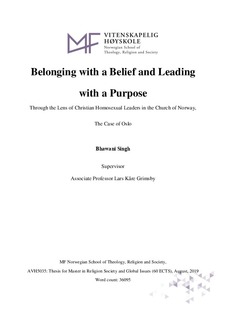| dc.contributor.author | Singh, Bhawani | |
| dc.date.accessioned | 2019-10-07T10:34:24Z | |
| dc.date.available | 2019-10-07T10:34:24Z | |
| dc.date.issued | 2019 | |
| dc.identifier.uri | http://hdl.handle.net/11250/2620608 | |
| dc.description.abstract | Western nations have their unique history about the arduous journey of achieving and institutionalizing the LGBT rights. In the presumed present context of dwindling religiosity and consolidating sexuality, this study moves upstream to explore the scope of realizing and ascertaining sexual identity within the religious periphery. The research undertakes the cases of LGBTs who have chosen to embrace Christianity as religious leaders in the Church of Norway. The contention of this research is to counter the perceived conflicting relation between religion and sexuality by exploring how religion and sexual identities can co-operate with each other.
This study incorporates the experiences and perceptions of lesbian and gay leaders in the Church of Norway and is limited to the Norwegian context. The major tool for analysis is the qualitative interviews is followed by in-depth follow-up interviews where necessary. The unique responses generated from each participant for open-ended questions enrich the findings making this study relatively diverse and inclusive. ‘Social Identity Theory, Social Identity Theory of Leadership and Transformational Leadership Theory’ are the employed theories in the study where the first theory plays a pivotal role in the scrutinization of the findings. With the aim to manifest the correlation between religion and sexual identity, the research is shaped to answer the research question: how do Christian homosexual leaders experience and perceive the relation between their religious and sexual identities with the shift of time?
The research evolves from the account of the challenges and improvements experienced by LGBTs, despite the institution being known as open towards sexual dissidents than other denominations in the country. The research subsequently addresses the means and approaches adopted by the leaders to counter the challenges and establish envisioned changes through their different enrolments. The role of leadership in the Church moves beyond the religious and sexual discourse to incorporate the agendas that concern the society at large.
The research concludes that the role of LGBT Church leadership is integral in reconciling the sexual and religious identities and also with all other social identities of an individual. The Church leadership works inclusively for different social identities by mitigating the intrusive conflicts that might arise due to incompatibility of identity differences. | nb_NO |
| dc.language.iso | eng | nb_NO |
| dc.subject | Den norske kirke | nb_NO |
| dc.subject | homoseksualitet | nb_NO |
| dc.subject | ledelse | nb_NO |
| dc.title | Belonging with a Belief and Leading with a Purpose : through the Lens of Christian Homosexual Leaders in the Church of Norway, The Case of Oslo | nb_NO |
| dc.type | Master thesis | nb_NO |
| dc.subject.nsi | VDP::Samfunnsvitenskap: 200::Sosiologi: 220 | nb_NO |
| dc.source.pagenumber | 125 | nb_NO |
